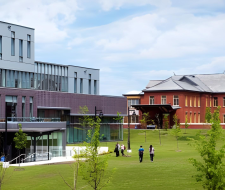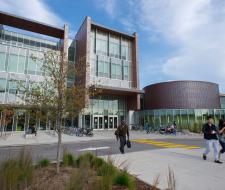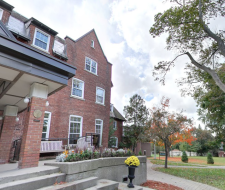Study law in Canada - 20 institutions
-
 from 75400.00 $CAD / year
from 75400.00 $CAD / year -
 from 8050.00 $CAD / semester
from 8050.00 $CAD / semester -
 from 12000.00 $CAD / year
from 12000.00 $CAD / year -
 ranked 157 in Canada for the year 2022
ranked 157 in Canada for the year 2022 CanadaToronto, OntarioCurrently watching: 5from 9100.00 $CAD / semester
CanadaToronto, OntarioCurrently watching: 5from 9100.00 $CAD / semester -
 In 2023 100% graduates achieved IB Diploma
In 2023 100% graduates achieved IB Diploma CanadaToronto, OntarioCurrently watching: 2from 24600.00 $CAD / year
CanadaToronto, OntarioCurrently watching: 2from 24600.00 $CAD / year -
 ranked at #1558 and it is ranked at 290 in Canada
ranked at #1558 and it is ranked at 290 in Canada CanadaToronto, OntarioCurrently watching: 2from 3750.00 $CAD / 14 weeks
CanadaToronto, OntarioCurrently watching: 2from 3750.00 $CAD / 14 weeks -
 ranked 1302 globally in 2022
ranked 1302 globally in 2022 CanadaToronto, OntarioCurrently watching: 2from 19374.00 $CAD / year
CanadaToronto, OntarioCurrently watching: 2from 19374.00 $CAD / year -
 ranked 55th among Canadian colleges. And #1315 in the world
ranked 55th among Canadian colleges. And #1315 in the world CanadaHamiltonCurrently watching: 2from 8000.00 $CAD / semester
CanadaHamiltonCurrently watching: 2from 8000.00 $CAD / semester -
 According to information for 2019, an average SAT score made up 1296
According to information for 2019, an average SAT score made up 1296 CanadaOttawa, OntarioCurrently watching: 2from 4900.00 $CAD / 3 weeks
CanadaOttawa, OntarioCurrently watching: 2from 4900.00 $CAD / 3 weeks -
 from 15164.00 $CAD / year
from 15164.00 $CAD / year
Legal education in Canada is one of the best in the world in terms of the quality of educational programs, the prestige of the diploma and the conditions of study and placement. Canadian universities offer a modern sought-after legal education that allows you to work in Canada, the USA, and Europe. Tuition fees, living expenses, household needs distinguish Canadian provinces from America or the UK. Universities in Canada offer English-language (less often French-speaking) law programs at all levels, the opportunity to undergo long-term internships in local, foreign companies in the country. The country's migration legislation favorably treats graduates of Canadian universities, they are in demand in the local, international labor market, occupy leading positions in various fields: judicial, legal practice, company management, consulting, politics, public organizations.
A distinctive feature of the Canadian legal system is its duality, which is determined by the influence of the Anglo-Saxon and continental legal traditions. The civil law of the country is determined by the Common Law in all regions except the province of Quebec, which is subject to the Civil Code of Quebec. This specificity is reflected in the educational programs of some universities (for example, the content of the courses of the Faculty of Law of the University of Montreal), the names of the degrees awarded to lawyers.
Smapse specialists will help you familiarize yourself with the requirements for admission, the list of documents, and the deadlines for submitting documents to law faculties of Canadian universities.
Alternative destinations
Law Studies in Canadian Schools
Schools in Canada include law studies in the middle school curriculum. high school offers to study disciplines related to the study of law, to choose from: world, national history, sociology, law, logic, rhetoric. For Russian, foreign teenagers, there are two options for entering a Canadian university:
- receive basic Canadian secondary education;
- to complete special pre-university courses.
The second option is suitable for foreign students, which certificate does not meet Canadian educational standards. Preparation programs for admission allow to strengthen knowledge in specialized subjects, the level of English (French), adapt to Canadian educational and everyday realities.
Pre-university training programs with in-depth study of jurisprudence in Canada:
Studying Law at Canadian Universities for foreign students
Canadian higher education institutions have a high ranking among educational institutions in the world, studying complies with international standards, is aimed at mastering the norms of general, international law, includes a large percentage of practical internships. Basic requirements for international students at Canadian law schools:
- graduation from a Canadian high school, 1-2 courses of a Russian specialized university, an international university preparation program;
- high results TOEFL, IELTS;
- Successful completion of the Law School Admission Test, which tests an ability to think logically, understand the structure of what has been read, and answer complex, long questions.
TOP law schools in Canada for foreign students
Studying at Mcgill Law School opens the door to a legal career in all Canadian provinces, several US states, and beyond. Graduates from McGill Law School are widely known for their critical thinking skills, openness to various problem-solving approaches and trust in new legal issues. McGill ranks 13th among the best universities in the world for law studies (Times ranking). McGill law professors are civil, common law experts, many of whom take a comparative, trans-system approach. The faculty of law at McGill University offers the BCL / LLB program, which graduates specialists with a cosmopolitan understanding of law, which is not limited to specific jurisdictions, legal traditions. Our students study legal concepts through the prism of general, civil law, national, world legal systems.
Upon completion of the program, students receive two degrees:
- Bachelor of Law (LLB, equivalent to JD);
- Bachelor of Civil Law (BCL).
Peter A. Allard School at the University of British Columbia is recognized as one of the leading law schools in Canada, has a worldwide reputation as a center for innovative research, inspiring teachers and prominent graduates. The faculty of the University of British Columbia are scientists who have received national, international recognition in various fields: from human rights to environmental sustainability. The school offers to obtain a master's degree in law by joining the development of one of the main research areas of the Allard School of Law:
- human rights law;
- business law;
- law on environmental protection, natural resources;
- Asian legal studies;
- jurisprudence;
- feminist legal studies.
The Université de Montréal Law School is recognized as one of the best law schools in Canada and abroad. The faculty is distinguished by a unique combination of intellectual pluralism, innovative scientific research conducted by professors and students in many areas of law. The University of Montreal is committed to providing students with a rigorous, innovative education that combines traditional legal concepts, developing research opportunities with an interdisciplinary approach. The university offers the following courses:
- short-term DESS program (Diplôme d'études supérieures spécialisées) - involves a year of study after graduation, obtaining a master's degree in law;
- Juris Doctor (JD) in North American Common Law;
- Master of Laws (LL.M.) in Comparative General Law;
- Master of Laws (LL.M.) in Comparative Private Law;
- Master of Law (LL.M.) in Notarial Law;
- Master of Laws (LL.M.) in Business Law (Global Context);
- Master in E-Commerce.
Royal Roads University (Canada) is a small private university that offers quality programs in the humanities and social sciences. The Master's program in Justice is based on an interdisciplinary approach to legal research to address complex social issues. Studying is suitable for those who are career oriented in state institutions, police, correctional institutions, customs, immigration services, commercial / non-commercial, international organizations.
Fanshawe College (Canada) prepares bachelors in Advanced Law Enforcement, Investigation, Security. A prestigious Ontario college graduate certificate promotes successful employment as a law enforcement officer and security officer. The learning process lasts two semesters, each ending with a five-week internship. The internship takes place in law enforcement, investigative, security agencies. This form of studying allows students to expand the knowledge base, skills in the field of specific work of law enforcement agencies, investigations, improve employment opportunities, and prepare for subsequent promotion to top positions. The teaching methodology includes physical preparation, mental health control skills, preparation for work in a court.
Law Academic Programs in Canada for foreign students
Future and current students of law faculties of world universities can take short-term academic programs with a study of legal sciences at leading universities in Canada. Programs have a common, narrow specialization, allow you to get to know the university better before starting studies, to fill in the missing knowledge in a particular industry.
Every summer, Toronto University invites foreign applicants, high school students to attend the Youth Summer Program. Students (16+) spend from one to five weeks at the Faculty of Law, studying Canadian, international law, developing legal thinking skills, public speaking.
Université de Montréal Law School Summer School invites you to 1 month summer courses. The program includes the following modules:
- Canadian legal system;
- US legal system
- Constitutional law of Canada;
- Human rights in Canada;
- Canadian Business Law
- North American Commercial Law, etc.
Vancouver summer program - A four-week academic program at British Columbia University for Canadian, international students from collaborating universities. It provides an opportunity to take two academic courses, including group work, discussions, projects, work with documents. Students can choose from 16 programs.
